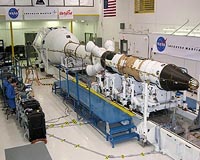 |
Bonn, Germany (SPX) Sep 08, 2009 On Tuesday 1 September 2009, the German Aerospace Center announced the third contest in the REXUS/BEXUS (Rocket/Balloon EXperiment for University Students) programme. Students are invited to submit their proposals for experiments to be carried in the gondola of a stratospheric balloon in Autumn 2010 or in a high-altitude rocket in Spring 2011. The deadline for proposal submission is 16 November 2009.
REXUS and BEXUS: Research in the polar circle A BEXUS balloon provides from two to five hours flight time for experiments, reaching the middle stratosphere at a maximum altitude of 35,000 metres. The flight of a REXUS rocket, on the other hand, only lasts for five minutes - but it carries its experiments to an altitude of around 90,000 metres, at the very edge of space.
Looking for creative, exciting and innovative concepts The students develop their experiments as small projects. They go from proposing an idea and planning its implementation to publishing their results. Between these two stages, the participants must build and test their experimental equipment. They participate in the launch preparations at Esrange, monitor and control their experiments from the control room, and end by processing the resulting data. Throughout the project, rocket and balloon technicians from DLR and the Swedish Space Corporation (SSC) support the students.
Germany and Sweden work together in the student programme Since the start of the programme in 2007, a BEXUS programme was implemented in October 2008 and a REXUS programme in March 2009, each with two flights. There have been five participating teams from German universities and high schools. The preparations for the BEXUS 8 and BEXUS 9 balloons are presently underway, and the launches are scheduled for 4-13 October 2009 at Esrange.
Application information As part of the REXUS/BEXUS programme, Thomas Reiter, a member of the DLR management board (responsible for spaceflight research and development) and an ex-astronaut, will give a lecture about his experiences in space and the experiments on the International Space Station and the Russian MIR space station. Share This Article With Planet Earth
Related Links German Aerospace Center Rocket Science News at Space-Travel.Com
 Orion Launch Abort Team Designs With Confidence
Orion Launch Abort Team Designs With ConfidenceHuntsville AL (SPX) Sep 08, 2009 Engineers at NASA's Marshall Space Flight Center in Huntsville, Ala., responsible for developing propulsion elements for the Orion crew capsule's Launch Abort System passed a major milestone Aug. 31 with the completion of Orion's Preliminary Design Review. The Launch Abort System is the critical element of the Orion capsule that will pull its crew safely away from the Ares I rocket in the ... read more |
|
| The content herein, unless otherwise known to be public domain, are Copyright 1995-2009 - SpaceDaily. AFP and UPI Wire Stories are copyright Agence France-Presse and United Press International. ESA Portal Reports are copyright European Space Agency. All NASA sourced material is public domain. Additional copyrights may apply in whole or part to other bona fide parties. Advertising does not imply endorsement,agreement or approval of any opinions, statements or information provided by SpaceDaily on any Web page published or hosted by SpaceDaily. Privacy Statement |